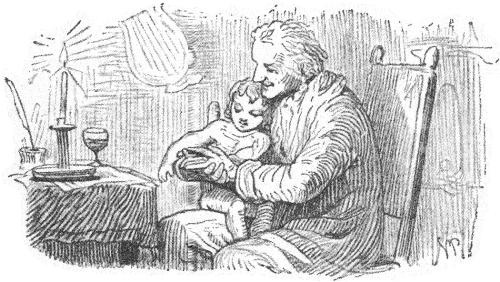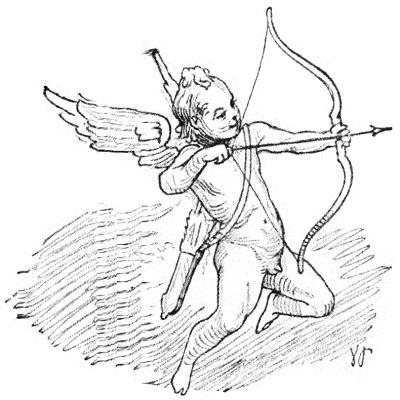
|
• полезная информация здесь |
The Naughty Boyby Hans Christian Andersen |
Malbonkonduta knabode Hans Christian Andersen |

| A long time ago, there lived an
old poet, a thoroughly kind old poet. As he was sitting
one evening in his room, a dreadful storm arose without,
and the rain streamed down from heaven; but the old poet
sat warm and comfortable in his chimney-comer, where the
fire blazed and the roasting apple hissed. “Those who have not a roof over their heads will be wetted to the skin,” said the good old poet. “Oh let me in! Let me in! I am cold, and I'm so wet!” exclaimed suddenly a child that stood crying at the door and knocking for admittance, while the rain poured down, and the wind made all the windows rattle. “Poor thing!” said the old poet, as he went to open the door. There stood a little boy, quite naked, and the water ran down from his long golden hair; he trembled with cold, and had he not come into a warm room he would most certainly have perished in the frightful tempest. “Poor child!” said the old poet, as he took the boy by the hand. “Come in, come in, and I will soon restore thee! Thou shalt have wine and roasted apples, for thou art verily a charming child!” And the boy was so really. His eyes were like two bright stars; and although the water trickled down his hair, it waved in beautiful curls. He looked exactly like a little angel, but he was so pale, and his whole body trembled with cold. He had a nice little bow in his hand, but it was quite spoiled by the rain, and the tints of his many-colored arrows ran one into the other. The old poet seated himself beside his hearth, and took the little fellow on his lap; he squeezed the water out of his dripping hair, warmed his hands between his own, and boiled for him some sweet wine. Then the boy recovered, his cheeks again grew rosy, he jumped down from the lap where he was sitting, and danced round the kind old poet. “You are a merry fellow,” said the old man. “What's your name?” “My name is Cupid,” answered the boy. “Don't you know me? There lies my bow; it shoots well, I can assure you! Look, the weather is now clearing up, and the moon is shining clear again through the window.” “Why, your bow is quite spoiled,” said the old poet. “That were sad indeed,” said the boy, and he took the bow in his hand -and examined it on every side. “Oh, it is dry again, and is not hurt at all; the string is quite tight. I will try it directly.” And he bent his bow, took aim, and shot an arrow at the old poet, right into his heart. “You see now that my bow was not spoiled,” said he laughing; and away he ran. The naughty boy, to shoot the old poet in that way; he who had taken him into his warm room, who had treated him so kindly, and who had given him warm wine and the very best apples! The poor poet lay on the earth and wept, for the arrow had really flown into his heart. “Fie!” said he. “How naughty a boy Cupid is! I will tell all children about him, that they may take care and not play with him, for he will only cause them sorrow and many a heartache.” And all good children to whom he related this story, took great heed of this naughty Cupid; but he made fools of them still, for he is astonishingly cunning. When the university students come from the lectures, he runs beside them in a black coat, and with a book under his arm. It is quite impossible for them to know him, and they walk along with him arm in arm, as if he, too, were a student like themselves; and then, unperceived, he thrusts an arrow to their bosom. When the young maidens come from being examined by the clergyman, or go to church to be confirmed, there he is again close behind them. Yes, he is forever following people. At the play, he sits in the great chandelier and burns in bright flames, so that people think it is really a flame, but they soon discover it is something else. He roves about in the garden of the palace and upon the ramparts: yes, once he even shot your father and mother right in the heart. Ask them only and you will hear what they'll tell you. Oh, he is a naughty boy, that Cupid; you must never have anything to do with him. He is forever running after everybody. Only think, he shot an arrow once at your old grandmother! But that is a long time ago, and it is all past now; however, a thing of that sort she never forgets. Fie, naughty Cupid! But now you know him, and you know, too, how ill-behaved he is! |
Estis iam maljuna
poeto, efektive bona maljuna poeto. Unu vesperon, kiam li
sidis hejme, ekstere farighis terura malbonvetero; forte
pluvegis, sed la poeto sidis varme kaj komforte che sia
kahela forno, en kiu brulis fajro kaj rostighis pomoj. “Sur la malfelichuloj, kiuj en chi tiu malbona vetero estas ekstere, ne restos ech unu seka fadeno!”, li diris, char li estis bonkora poeto. “Ho, malfermu al mi! Estas al mi malvarme kaj tiel malseke!” subite vokis ekstere malgranda infano. Ghi ploris kaj frapadis je la pordo, dum la pluvo faladis torente kaj la ventego furiozis che chiuj fenestroj. “Ho, malfelicha estajho!” diris la maljuna poeto kaj levighis, por malfermi la pordon. Tie staris malgranda knabo; li estis tute malseka, kaj la akvo fluis el liaj longaj blondaj haroj. Li tremis de malvarmo; se li ne estus enirinta, li certe pereus en la malbona vetero. “Vi malgranda knabo!” diris la maljuna poeto kaj prenis lin je la mano. “Venu al mi, mi jam varmigos vin! Ankau vinon kaj pomon vi ricevos, char vi estas belega knabo!” Tia li efektive estis. Liaj okuloj aspektis kiel du helaj steloj, kaj kvankam el liaj haroj fluis la akvo, ili tamen estis tre charme krispaj. Li aspektis kiel malgranda anghelo, sed li estis pala de malvarmo kaj tremis per la tuta korpo. En la mano li tenis belegan pafarkon, kiu tamen estis tute difektita de la pluvo; la koloroj de la belaj sagoj tute intermiksighis pro la malseka vetero. La maljuna poeto sidighis denove che la forno, prenis la malgrandan knabon sur la genuojn, elpremis al li la akvon el la haroj, varmigis liajn manojn en siaj propraj kaj kuiris por li dolchan vinon. Tiam la knabo refortighis, ricevis rughajn vangojn, saltis malsupren sur la plankon kaj komencis danci chirkau la maljuna poeto. “Vi estas gaja knabo!” diris la maljunulo. “Kia estas via nomo?” “Mi estas nomata Amoro!” li respondis; “chu vi min ne konas? Jen kushas mia pafarko. Per ghi mi tre bone pafas. Rigardu, nun la vetero ekstere farighas denove bona; la luno lumas!” “Sed via pafarko estas difektita!” diris la poeto. “Tio estus malbona!” diris la malgranda knabo, kaj li prenis la pafarkon kaj esploris ghin. “Ho, ghi estas jam seka, kaj ghi tute ne difektighis. La tendeno estas tute en ordo; nun mi ghin elprovos!” Kaj li strechis la pafarkon, metis sur ghin sagon, ekcelis kaj pafis al la maljuna bona poeto rekte en la koron. “Nun vi povas vidi, ke mia pafarko ne estis difektita!” li diris, laute ekridis kaj forkuris. La malbona knabo! Tiele pafi sur la maljunan poeton, kiu tiel afable akceptis lin en sian varman chambron, estis tiel bona por li kaj donis al li tiel belan vinon kaj plej bonan pomon! La bona poeto kushis sur la planko kaj ploris, li estis trafita rekte en la koron. “Fi!” li diris, “kia malbonkonduta knabo estas tiu Amoro! Al chiuj bonaj infanoj mi tion rakontos, por ke ili povu gardi sin kontrau li kaj por ke ili neniam ludu kun li, char li farus al ili nur malbonon.” Chiuj bonaj infanoj, knabinoj kaj knaboj, al kiuj li tion rakontis, efektive estis singardaj kontrau la malbona Amoro, sed li tamen superruzis ilin, char li estas tre lerta kaj ruza. Kiam la studentoj venas de la lekcioj, li iras apud ili, en nigra redingoto kaj kun libro sub la brako. Ili ne rekonas lin kaj tial enlasas lin en sian mezon, char ili pensas, ke li ankau estas studento; sed tiam li traboras al ili la bruston per sia sago. Kiam la knabinoj venas de la predikisto kaj kiam ili staras en la preghejo, li ankau chiam estas malantau ili. Jes, en chiuj tempoj li estas malantau la homoj. Li sidas en la granda lustro en la teatro kaj lumas tre hele; homoj pensas, ke tio estas lampo, sed poste ili rimarkas, ke tio estis io alia. Li kuradas en la regha parko kaj sur la remparoj; li iam pafis ech vian propran patron kaj vian propran patrinon rekte en la koron. Demandu ilin, kaj vi audos, kion ili diros al vi. Jes, tio estas malbona knabo, tiu Amoro, neniam havu ian aferon kun li. Malantau chiuj homoj li aperas. Prezentu al vi, li iam pafis sagon ech en la maljunan avinon. Estas vero, ke de tiam pasis jam multe da tempo, sed shi neniam tion forgesas. Fi, la malbona Amoro! Sed nun vi lin konas; rimarku, kia malbonkonduta knabo li estas! |

Г.Х. Андерсен
Скверный мальчишка